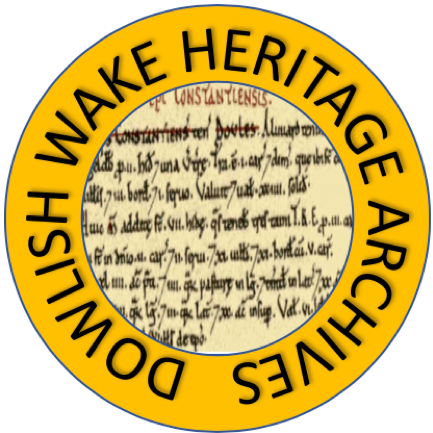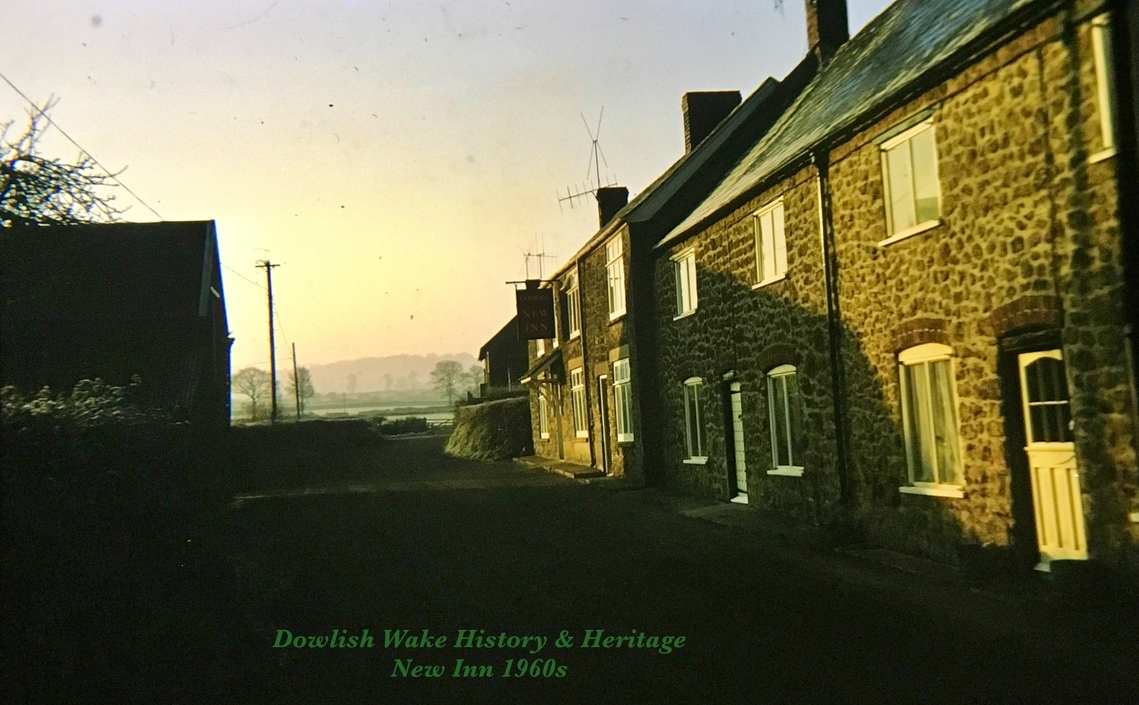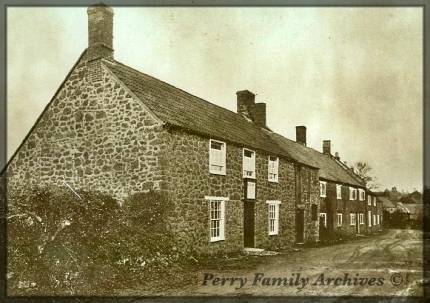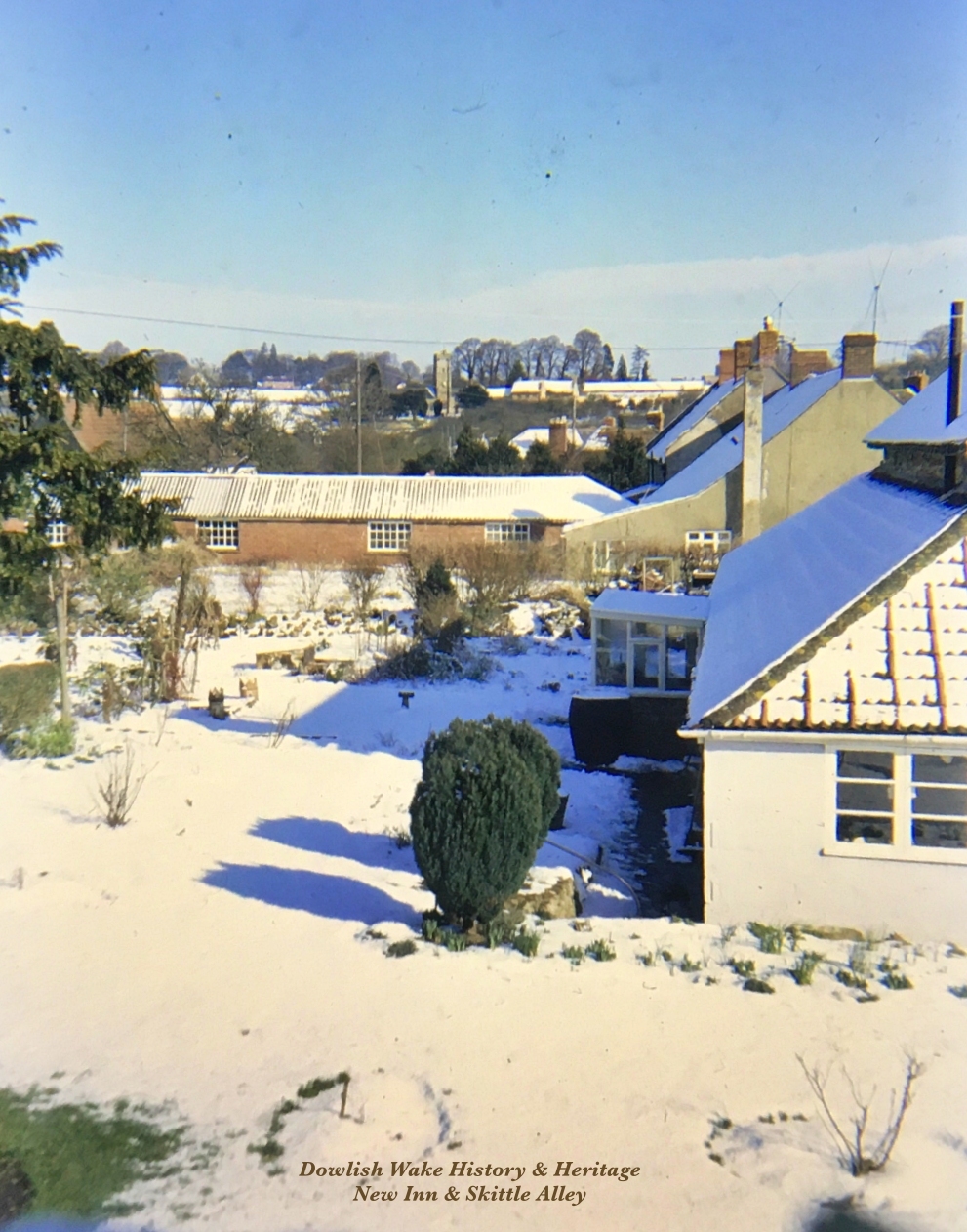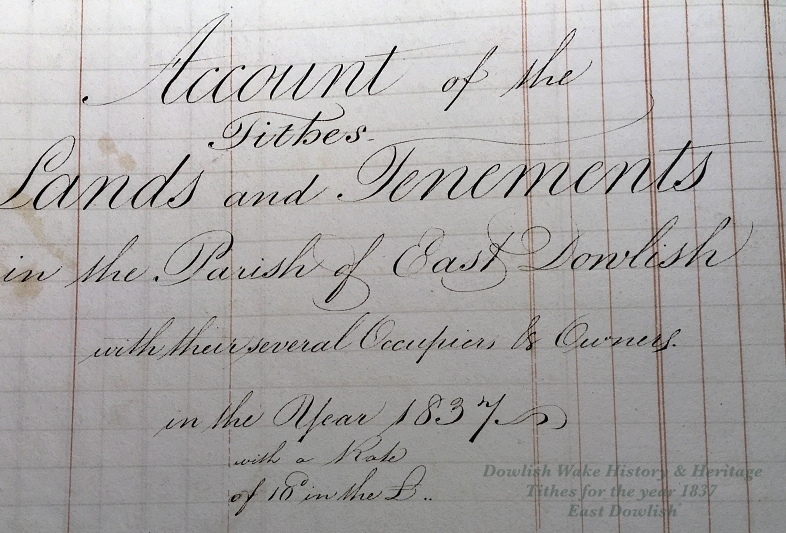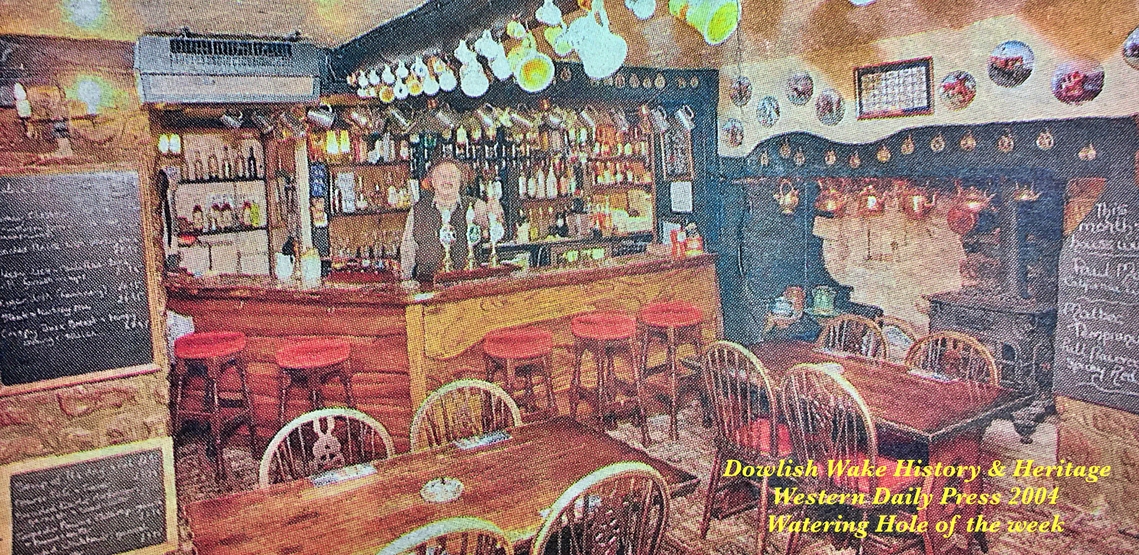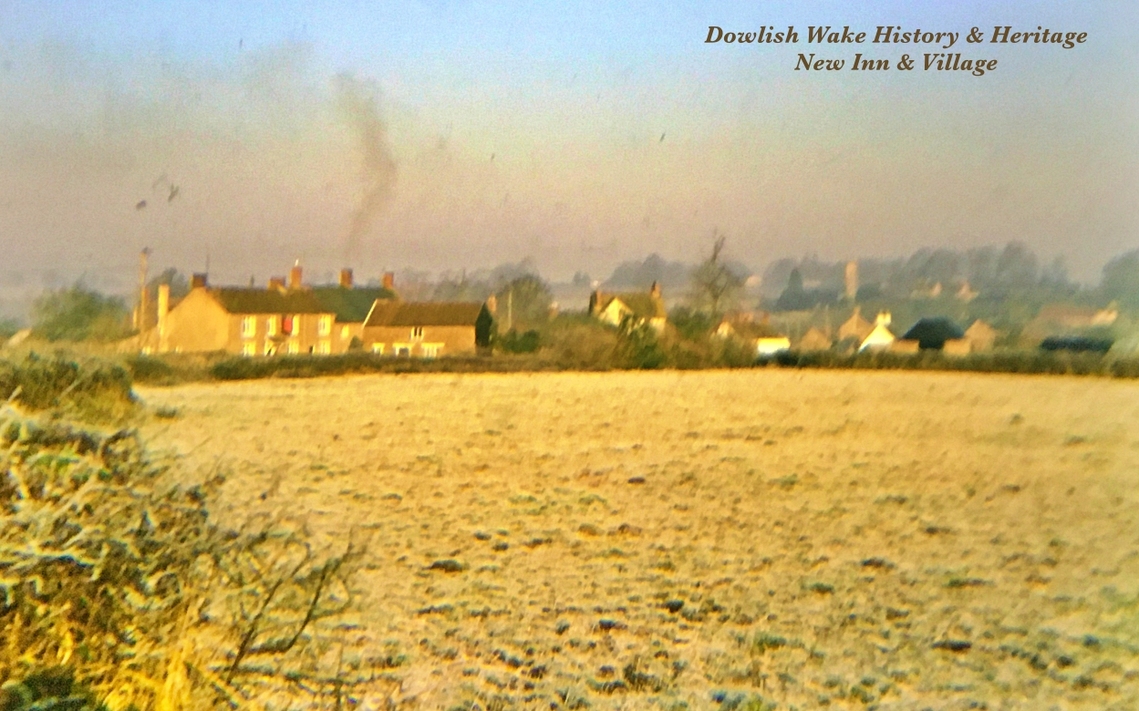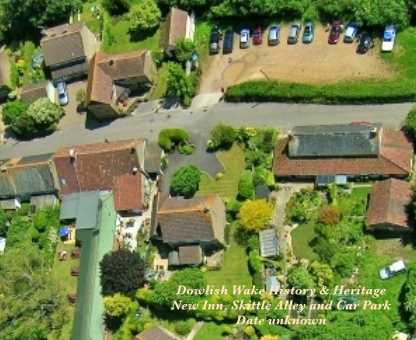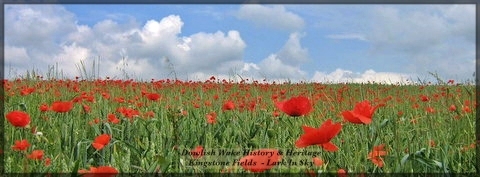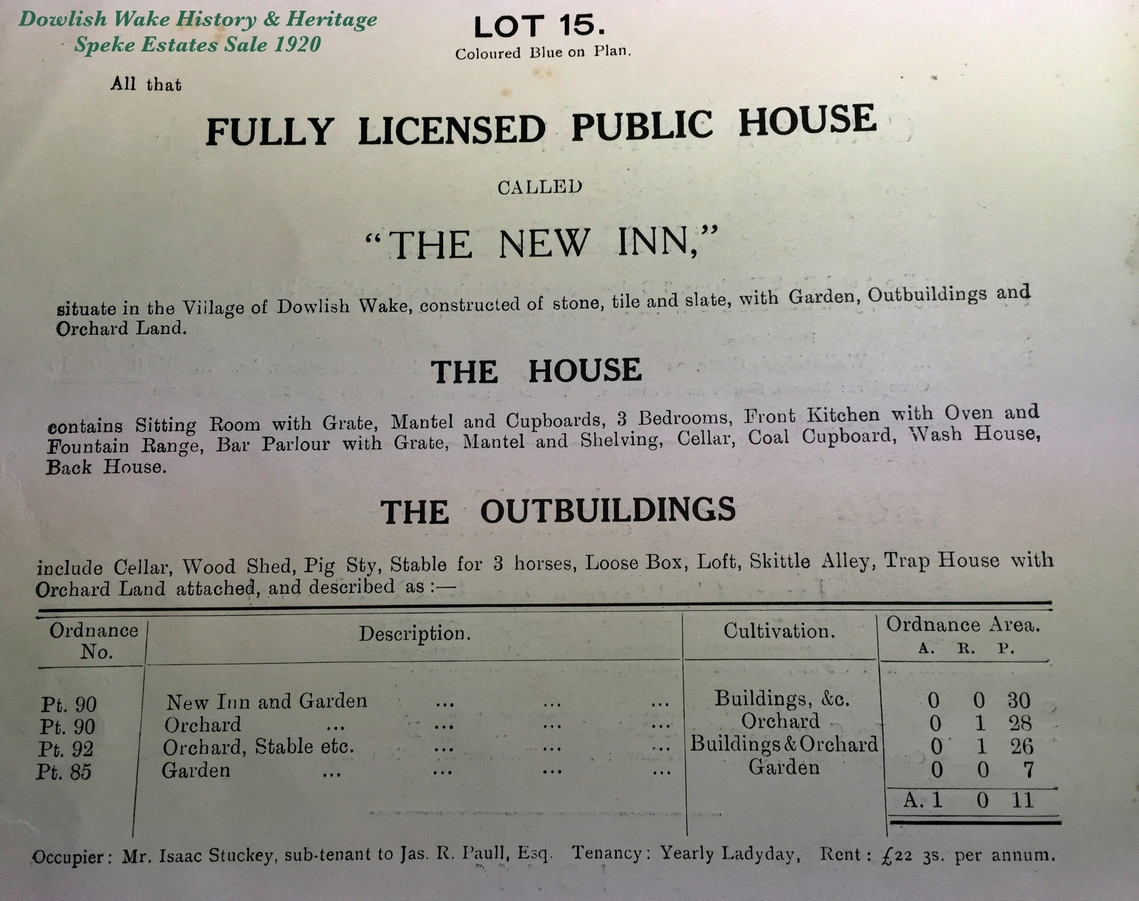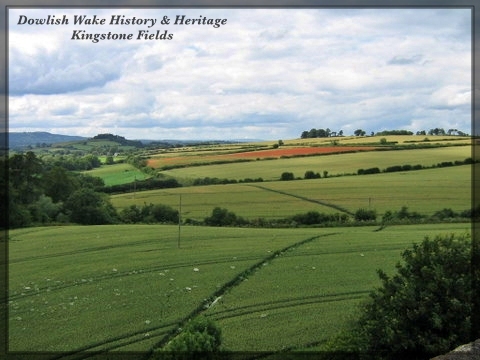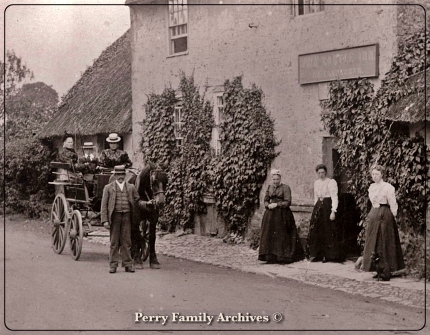The New Inn
The Parish of Dowlish Wake is thought to have had, at one time, three inns, with a licensed victualler by 1735 and three by 1751. The New Inn dates back to the mid-17th century, formerly The Horseshoe or The Three Horseshoes, until it became 'The New Inn' around 1812-1822.
The Castle [formerly The Folly] at Kingstone was converted into a private dwelling around 1972.
A third inn, possibly by the packhorse bridge. We were told Wayside or Bridge Cottage has an extra-large doorway, big enough to roll a barrel through!
There were also it seems, Cider Shops in villages such as Dowlish Wake, small enterprises in 1800s, due to the often unavailabiliy of safe clean drinking water. It's said that it was not uncommon for farm labourers to drink three or four pints of cider or small ale each day.
There was a time when outdoor farm labourers’ wages were partly paid with a small keg or firkin of cider, often of differing quality. Farmers made their own cider, but It was rumoured that two taps were kept running by some farmers, one for himself and friends (‘first wringing’ and one for the farm labourers, ‘second wringing! ]
Drinking water was not always wholesome; cider or small-beer would be drunk at any time of day. But it was also drunk on a social level for ‘fellowship’ in village ‘cider shops’ [sometimes illegal].
For some, too much ‘Good Fellowship’ the drinking of ale or cider by village folk was of growing concern for the habits and morals of people!
The National Archives lists correspondence from the Dowlish Wake Rector to Thomas Tenison, Archbishop of Canterbury.
In 1699 William Will’s, the rector of Dowlish Wake, was seeking to curb the selling of ale & cider in common ale houses, 'tippling' houses. A letter sent to Thomas Tenison dated 26th December 1699, proposing the suppression of profaneness;
1, Suppression of ale houses alias Hell houses, but not in market towns
2, Authority for the minister to make affidavits to J.P.s or at Sessions of all disorders in their parishes.
Dowlish Wake New Inn has been many things to many people over the years. The hub of most villages’, a village inn with stone floors, open fireplaces and raftered ceilings. In 1920, it had all manner of outbuildings, a 3 horse stable, and a traditional trap house with its cask-drop trap door for the cider barrels. The orchards around the inn provided the apples to make their own cider.
We are told that when Felix Gray was landlord, he made coffins and the arrangements for the ‘dispatching’ of folk. It’s said the village children sharing all sorts of stories about the ‘box’.
The village ‘Cooper’, John Graddon of Primrose Villa, was kept busy, a 'brewers cooper’ in the 1911 Census, working, we think, out of a building near Prospect Cottage.
The Skittle alley had its leagues and competitions, the results of which were published in the local papers over many years. An old photo shows a snowy Skittle Alley and rear of New Inn, with Rose Cottage and Meadowview cottages in the foreground.
From the village archives, an explanation as to how things were. [The Somerset Magazine in 1998] It explains:
"The pub now comprises two separate bars but previously also had a cellar where cider was made and sold – a practice which ceased in the early 1930s. The publican at the time was Mr Gray, who was previously a carpenter. It is likely that he used to trade only next door as there was a shop-cum-post office there, which had a carpentry business attached to it. There is a recollection of coffins being made there and when children went to buy sweets from the shop, they would curiously peep at the carpenters wondering if they might glimpse some macabre sight!”
Inn Keepers at The New Inn – [The Horseshoe/ Three Horseshoes]
1834-1837 Owner John Dight with occupier James Turner
1847-1875 Owner John Dight with occupier Joseph Foxwell
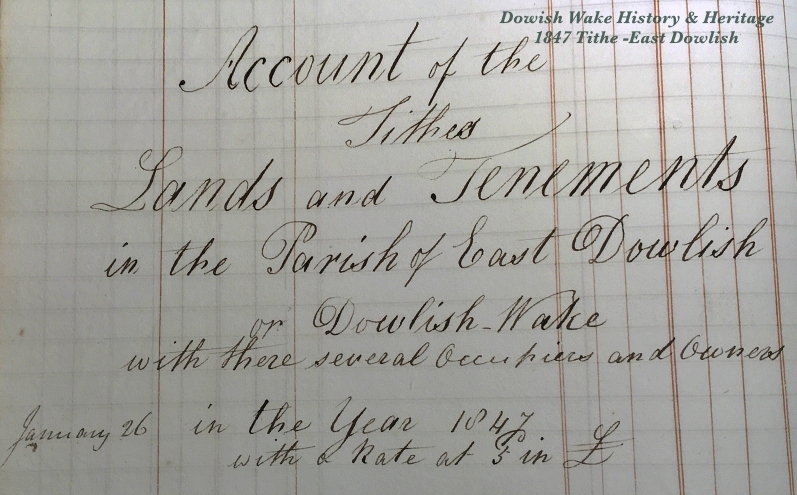
1866 – Joseph Foxwell summoned – illegal cups of measure
1870 - Job Perry appears in a Local Bankrupts Listing
1871 - Joseph Drywell, a bankruptcy case
1877 – Joseph Foxell appears as owner, now selling up.
1877 – 1920 [Owner Speke Estate].
1879 - 1895 Henry Amor
1897 - 1910 Richard Manning
1914 - Archibald Perry
1919 – 1927 Isaac Stuckey
1920 - Speke Estate Sale. Purchaser Major James Ratley Paul of Ilminster Brewery
1931 - Mark Gummer
1933-1964 Felix Percy Gray - Carpenter–Wheelwright- Inn Keeper.
1939 – Felix Percy Gray – Publican & Gardener
1967 - Harry Legg and wife Gwendoline.
1983 - Steve and Barbara Hayman
1990 Andrew Brew Johnstone
2004 Newspaper clipping Landlord unknown. ‘Watering Hole of the Week’.
Other names, details vague; D. Barrow/ C. Kelly/R.A.Gray/A Toms/ Mr Smith/Mr Kimber.
Newspaper Archives Snippets.
4th January 1879 The Chard & Ilminster
Heading! 'A liking for Ferrets'.
Robert Perry of Dowlish Wake was summoned for stealing a ferret valued at 10s. Alfred Huddy said it had been taken from his outhouse on 25th November. The constable went to the New Inn, Mr Henry Amor’shouse, and was told Henry had brought it. Perry was sentenced to three weeks imprisonment with hard labour. Shortly after, on 30th November, the same Robert Perry was charged with stealing another ferret which was sold to Mr Baker. He was sentenced to one month’s imprisonment for this offence to commence after the first sentence expired.
Wed 10th January 1883 The Taunton Courier.
Notice is given that I, Henry Amor of the New Inn, Dowlish Wake, will not be responsible for any debt or debts contracted by my wife, Mary Ann Bright, residing in Stoke St Mary. [Otherwise known as Mary Ann Amor in Census Returns].
The Courier Wed 30th May 1894
The Dowlish Wake Friendly Society annual dinner and parade
New Inn - plum pudding served by the hostess Amor, with whom much sympathy was shown as she had buried her husband only the day previous.
16th February 1895 The Chard & Ilminster
An Unreserved Sale of Livestock and Implements, including ; Dairy Cattle [6 superior Devon and cross-bred dairy cows, some with calves at foot and others very forward], 4 desirable two-year-old heifers [cross cross between Devon and Short Horn], 2 powerful staunch Cart Horses, excellent shape and very reliable, a one horse wagon, a spring wagon, 2 strong putts, a spring market cart, harnesses, hay machine, chain harrows, hay collector, hand trucks, winnowing machine, chaff cutter, and Swine & wagons, carts and numerous other items, not forgetting the milking stools and a the double barrel breech-loading gun! The sale to be held at The New Inn in Dowlish Wake on Tue 19th February 1895, by order of the trustee of the Will of the late Mr H Amor, deceased.
13th August 1898 The Chard & Ilminster
A James Furzer was charged with stealing a pair of shoes from the kitchen of the New Inn at Dowlish Wake on 13th February Value 4 shilling. They belonged to a gardener Dan Everleigh, lodging at the inn, also worked in the kitchen. Mary Ann wife of landlord Richard Manning served him some beer in the kitchen, while he sat at the fire, while she was in the back kitchen the prisoner left. They were sold on to Fred Stone in the Nelson Arms Inn, Ilminster, He would go to trial at Wells on 19th October. Outcome unknown.
29th April 1899 The Chard & Ilminster
Mr Manning of the New Inn Dowlish Wake was granted an extension of one hour on 3rd May.
1920 Sale of Speke’s Dowlish Manor Estate.
16th March 1920
The George Hotel in Ilminster
Lot 15 sold for £825
Purchaser Major J R Paull of Ilminster Brewery.
Somerset Country Herald. Sat 16th February 1957
‘Ilminster Licensing Surprise’
Consideration of Removal of licences of ten public houses.
Houses concerned include New Inn, Dowlish Wake.
The Courier Wed 4th October 1933
Transfer of Licences
New Inn Dowlish Wake
From Mark Gummer to Felix Percival Gray.
Somerset County Herald. Sat 1st August 1936
Somerset Petty Sessions
‘Flagmans Escape’ Seavington junction of Yeovil to Ilminster road.
Diverted traffic-road alterations - a flag man on duty.
William Chalk was summoned for driving a Motor-Cycle on 25th June without due care and attention. The flagman of The New Inn, Dowlish Wake, Cecil Chas Thomas Poke, was on duty. Long story, but Chalk was fined 5s and disqualified for one month.
13th July 1963 Taunton Courier
Football supporters Skittle cup competition at The New Inn, Dowlish Wake.
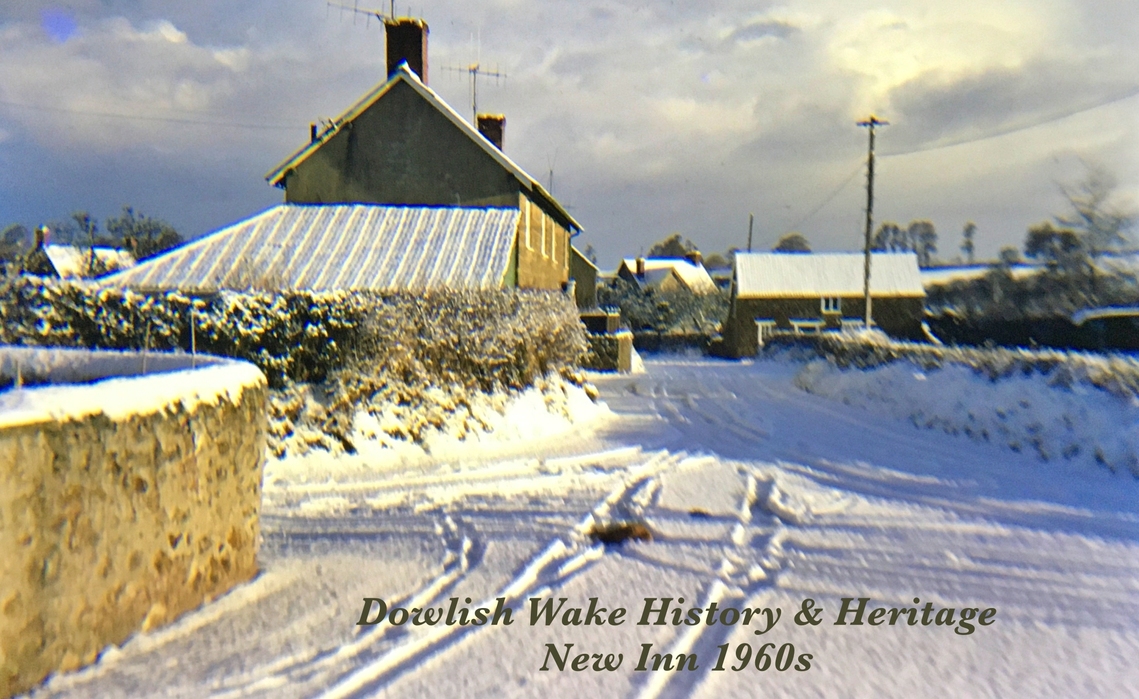
Dowlish Wake Taverner in 1836
Like many surnames, when researching, we rely on the written word. Newspaper Archives are more than helpful. One such in 1836, a taverner in Dowlish Wake, Joseph Cook, a tale of a sad occurrence. [Western Flying Post, Sherbourne and Yeovil Mercury, 28th March 1836].
'The small village of Dowlish, near Ilminster, was thrown into a great excitement on Monday Night, between nine and ten o'clock, by the following sad catastrophe. A man named Joseph Cook, senior keeper of a cider shop in the parish, frequently quarrels with his son. At those times, the mother generally interfered on behalf of the son. On the night in question, the son came home in a high state of intoxication. When a quarrel began, the father attempted to put him outdoors, and the mother endeavoured to effect a separation. During the scuffle, it is generally supposed she received a blow, as she died about two or three minutes later.
Mary Cook died on 27th March 1836 and was buried in St Andrews Churchyard, a year later joined by husband Joseph Cook [senior], 64, buried in November 1837. In 1832 he, Joseph Cook [senior] was included in the Electoral Poll book for Dowlish Wake, owner occupier of a freehold house & land. The son in 1851, a thatcher found himself in Chard Union Workhouse, together with his wife and four children.
Mr Joseph Foxwell
A sale by auction of his animals and other effects advertised in the Chard & Iminster News on 11th August in 1877 suggests ownership of the New Inn. Sale due to declining business and leaving the neighbourhood’.
The Sale reads; to sell by Auction on Thursday 16th August 1877; Live and Dead Stock, Hay, Keep, Cider and Casks, Dairy Utensils, Furniture and other useful effects. Dairy, well-bred and good milkers, the luxuriant pasture abundantly supplied with water. To view, apply to Mr Foxwell at The New Inn.
In 1866 Joseph Foxwell of the New Inn, Dowlish Wake, had been summoned for having nine illegal cups [of measure] in his possession on 1st November. Supt. Everett proved that he found the six pints and three quarts produced in the defendant's house. The pints were half-a-gill short, and the quarts were nearly as bad. He was fined £1 and 7s 6d costs!
Felix Percy Gray
He spent some 30 years as a licensee of the New Inn, taking on the licence in September of 1933 from Mark Gummer, landlord of the New Inn. He died in 1964, aged 81 years. Interested readers might wish to enlarge on the time that Felix Percy Gray was the landlord of the New Inn here in Dowlish Wake.
War record:
1914-1920 WW1
R.A.M.C Corps
Pte. 26781
Medals: Victoria Cross Medal, British War Medal
Details of the 1920 Sale of The Dowlish Manor Estate
Lot 15
16th March 1920 - The George Hotel in Ilminster
Lot 15 sold for £825 - Purchaser Major J R Paull of Ilminster Brewery.
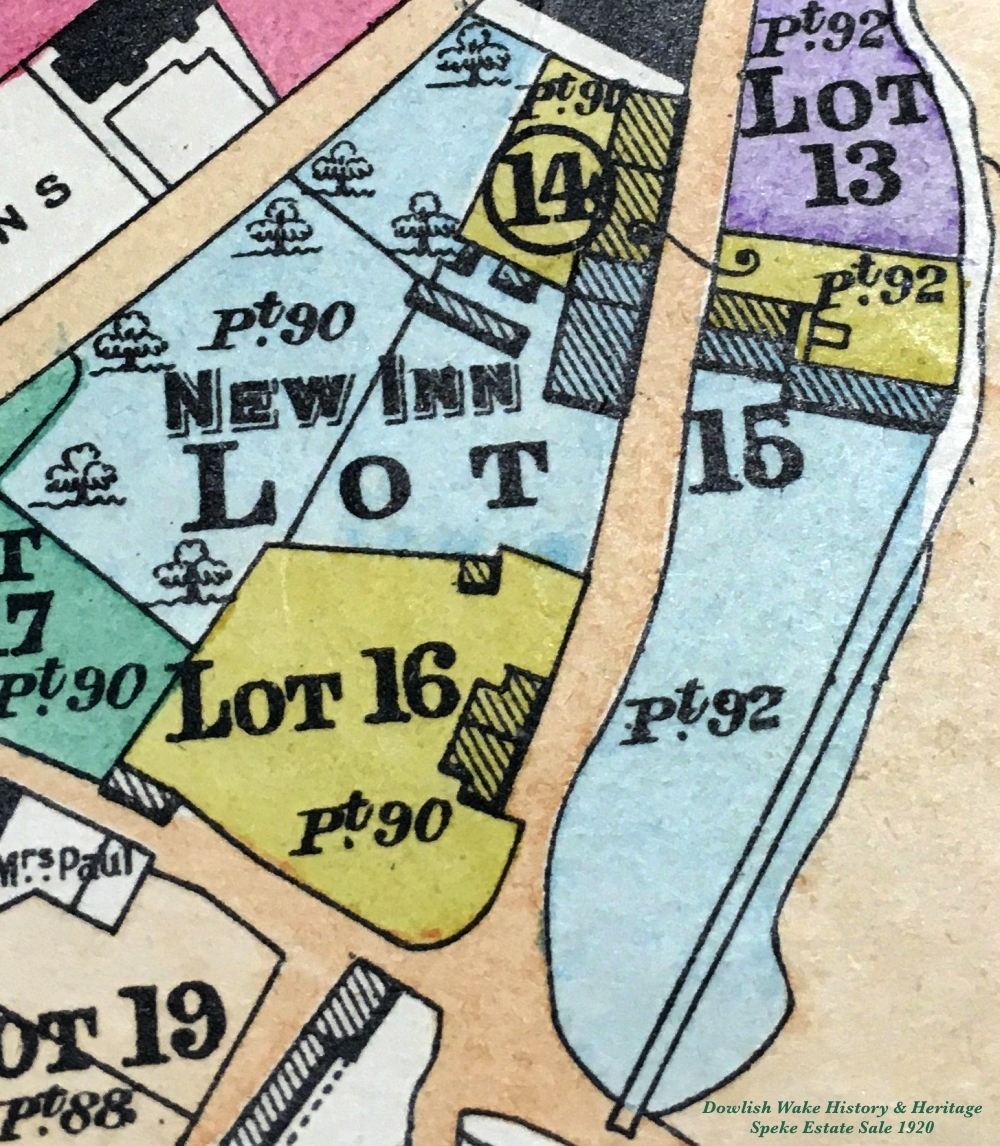
Isaac Stuckey, his war years and home-coming
New Inn - Dowlish Wake
Born 1881, baptised August 28th in Seavington St Michael, by 1911 the Census shows Isaac Stuckey, 29 working in Wales, a Baker. Lodging with his employer, Baker, Samuel Higgins and family, Gilfach, Cardiff. Later that year, he marries Florence Hallett in Ilminster.
War record:
1914-1920 WW1
Isaac Stuckey entered the Welsh Regiment in January 1915.
Private No 5744, 1st Battalion, Corps Welsh Regiment
Medals: Victoria Cross Medal, British War Medal and 1914-1915 Star
Discharged: 27th October 1915
Theatre of War: France
In 1915, a newspaper heading “Arrival of Injured Soldiers", told of Pte. Isaac Stuckey, of the 1st Welsh, was among a party of some 20 British invalid "brave fellows" back from the war front and being transported from Bristol Hospitals via train to Gloucester. All but two could walk, but "Two squads of St Johns Ambulance" helped the wounded onto a Char-a-banc for the Gloucester Red Cross Hospital, to be treated for frost bite and other injuries.
Landlord of the New Inn.
Isaac Stuckey is found at the New Inn from 1919 – 1927 onwards - Kelly's Directories.
His Death registered 1939 in Merriott, aged 58 years. Semi-military honours were accorded at his funeral. Readers may have additional content to offer that could be added to this Dowlish Wake landlords story.
The Castle [formerly The Folly] at Kingstone, also has online records of interest, this too, will be explored in a future article. But to set the scene we have this photo from Perry's Archives.
Further reading and sources:
All newspaper records -The British Newspaper Archive – Find my past online subscription website. findmypast.co.uk
Felix Percy Gray. See the website pubshistory.com for Photos of Percy and his time at the New Inn.
Isaac Stuckey. Funeral, The Western Times Friday, 10th November 1939, page 8.
Isaac Stuckey, wounded - Newspaper Archive -Findmypast subscription online website] [Page 6, Gloucester Journal, 13th March 1915]
For old maps online, check out 'Know Your Place' website at kypwest.
Taunton Record Archives swheritage.org.uk
Transfer of Licensees. 1933 – from Gummer to Gray. The Courier October 1933.
Cider as wages, 1st and 2nd wringing. Article, Page 3 Bridgewater- ‘The Somerset Agricultural Labourer’
The Morning Advertiser, Saturday 25th May 1872.
Memories and notes of Marguerite Perry.
Inns -A History of the County of Somerset – 1978 – South Petherton Hundred – pages 151 to 156.
Newspaper cutting - Somerset Magazine 1998 September – pages 25 & 39.
Little Red Booklet -Dowlish Wake by Duncan Charmers, page 18.
Ale Houses & William Wills– discovery.nationalarchives.gov.uk – MS942 -152 Miscellaneous Papers.
